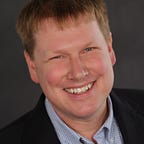Corporations are people…
…but corporations are not a person
Like my friend Miguel de Icaza, I was struck by this quote from Evan Martin’s recent blog post about leaving Google:
“[Google is] ultimately not something to be anthropomorphized, but rather a faceless machine that makes often bad decisions that I don’t have any real influence over”
However, unlike Miguel, I’m not sure I agree with it.
I often hear engineers talking about companies that have let them down in these kinds of terms: as an uncompromising and inscrutable monolith that can’t be reasoned with.
I’d posit that it’s exactly the opposite.
The reality is that corporations are people: fundamentally, a corporation is a group of people authorized to act as a single entity. But people are flawed and human. We screw up and make mistakes. We don’t communicate perfectly with one another. We overlook things. We often make bad decisions, as Evan notes.
This is not unique to Google, of course. It was true of Microsoft, where I worked for nearly twenty years. It’s true of churches and other organizations of which I’ve been a part. It’s true of political parties and other social groupings.
But here’s the thing: when you work at a company, you’re one of those people. You are part of the problem and part of the solution. That “faceless machine” is not faceless at all — it’s an assembly of myriad faces, of which you are one.
Senior leaders trade great control of one problem for little control over many problems.
One of the most interesting insights I’ve gained as my own career has developed has been the realization that even the most senior leaders are surprisingly powerless. They may have “authority” over a broader portfolio, but their hands-on ability to drive change in any one area is greatly diminished. They have traded great control of one problem for little control over many problems. Much time is spent gently pushing the tiller in one direction or another, often in response to insights or initiatives proposed by those at other layers of the organizational hierarchy.
If a company like Google is a faceless machine, then who is operating it if not the people who work there? In the annual poll, I often am amused to hear engineers commenting that they have no answer to the inevitable questions about whether their VP is doing a good job, since they claim no real awareness of who the VP is or even what they do. Doesn’t that seem incompatible with the notion that they are some Svengali-like figure who can manipulate every aspect of the machine?
A ton of bad decisions do get made in every organization, of course, typically because of something like mismatched incentives (a team who is organizing around local maxima, or a strategy that is not aligned with the market), sunk cost fallacies or a mistaken assumption that doing what worked in the past will continue to work well in the future.
Yet it’s surprising how many decisions are up for grabs, even in a huge 100,000+ company like Microsoft and Google. Good people make good things happen. Rather than being powerless against the faceless machine, we are the machine. In what we do, we set the culture, we create the bar for what is tolerated, and we design the future through our decisions.
With very few exceptions, companies are not dominated by one single person: they’re a collective of competing ideas and perspectives, and even the most powerful CEO is rarely hands-on enough to do more than set a culture that rewards success. That’s true of Google and Microsoft, and probably any company you might choose to go to in protest against “the machine”.
For sure, pick a company based off its alignment with your values, its definition of success, and its institutional health. Work for something you believe in. But then be an active builder of that culture. Who has “real influence”, if not the people who constitute the company? Corporations are neither a machine nor a person: they’re people. So play your part!
